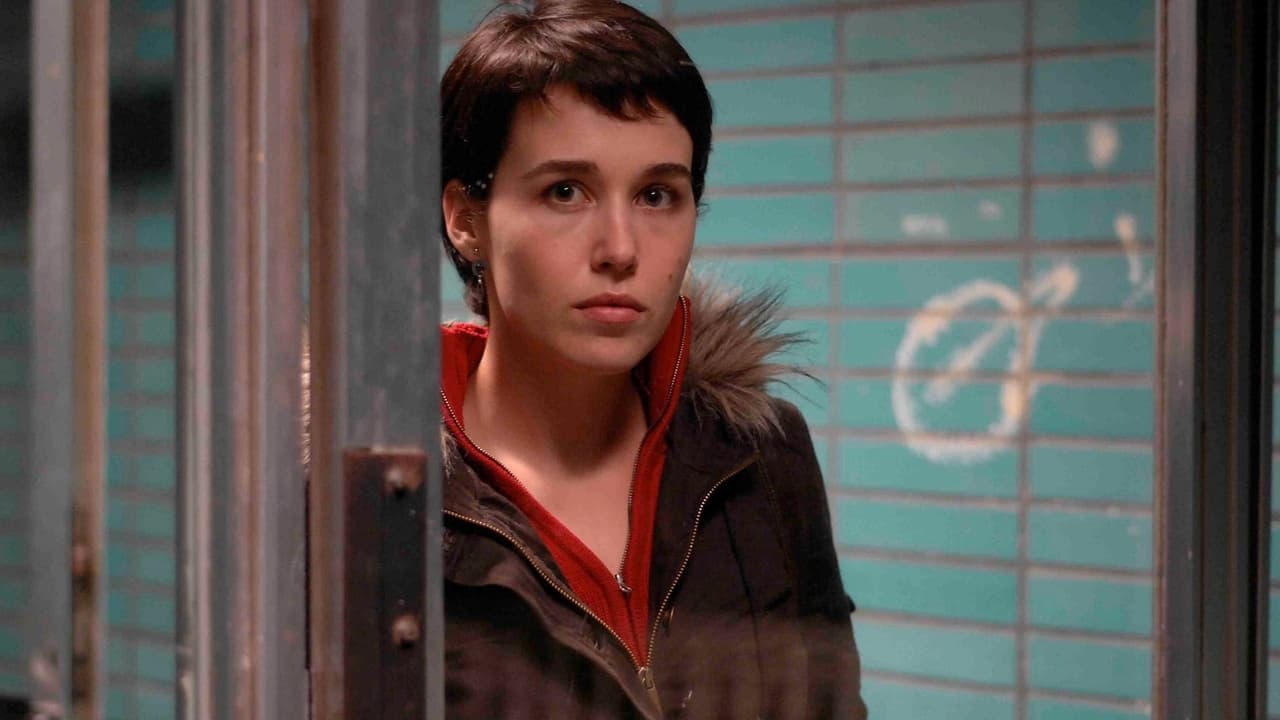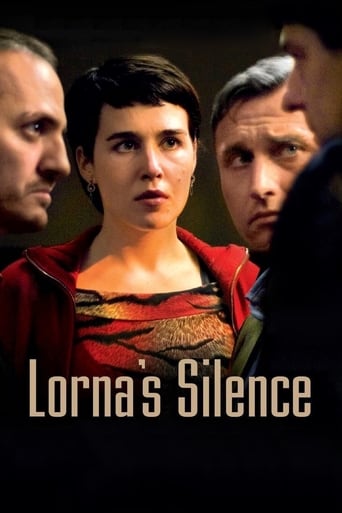



Overrated
Excellent, a Must See
The plot isn't so bad, but the pace of storytelling is too slow which makes people bored. Certain moments are so obvious and unnecessary for the main plot. I would've fast-forwarded those moments if it was an online streaming. The ending looks like implying a sequel, not sure if this movie will get one
View MoreThis is one of the best movies I’ve seen in a very long time. You have to go and see this on the big screen.
View MoreHaving now seen it twice - what a terrific film! Arta Dobroshi is literally on screen for every single scene, and for all but a few seconds of the film: an amazing performance. When will we see more of her? The subject-matter is pretty grim, and not for those who like only romcoms and the like. I love all the Dardenne brothers films: Rosetta, The Son, and The Child, which rivals Lorna for their best in my view. Their usual trademarks are here, hand-held cameras following the characters round, usually in close-up; drab industrial surroundings (the town of Liege I believe); characters on the margins of society, including here a dodgy Russian with his interpreter. A great movie.
View MoreLe silence de Lorna (Lorna's Silence) is the latest film by the great Dardenne brothers. They are modernizing cinema of today philosophically as they are narratively. Compared to another film by the brothers Le fils (2002) Le silence de Lorna is not as experimental, but at least as good, if not better. It's their first portrait of an adult woman and they succeed incredibly well as always. The film deals with the European identity of today, inhumanity in human trafficking, and puts us in front of a social question: how can humanity or any sort of morality remain in this cruel world we live in?Lorna (Arta Dobroshi) is in her thirties living in Belgium and dreaming of a better life. She lives in an arranged marriage with a junkie, Claudy (Jérémie Renier). The man who runs the arranged marriage business, Fabio (Fabrizio Rongione) is planning to kill Claudy in hope of a better marriage deal. Fabio arranges men to marry Lorna for money so they can get a citizenship of Belgium. Le silence de Lorna deals with the subject of human trafficking; business where the price of human life isn't high. It all happens in front of our eyes but we aren't doing a thing. In the end it grows out to be a strong moral study and the influence Krzysztof Kieslowski has had on the brothers is obvious.The Dardenne brothers are well known for their minimalism which can also be seen in Lorna's Silence. It doesn't have much music in it and the dialog is marginal - a lot from little is the core of minimalism. Luc Dardenne has said that he always listens to Beethoven before starting to work and, in the end, when the credits come on we get to listen Beethoven. The brothers have said that the more you take material away the closer you get to humane experiences. Their films are filled with body language, gestures and close camera-work. The cinematography is unique and reinforces the position of a camera as an instrument for philosophy. They follow their characters closely and through that let us observe the situations they get into, the situations in which they are prisoners of. The camera let's you to get into the minds of the characters. The camera sees what the character sees, it doesn't know what happens outside of the character's world - so what has been cloaked from us?The leading themes of the story are humanity, detachment, guilt, inhumanity and the European identity of today. The subject is very current in the age we live in. As I earlier mentioned Le silence de Lorna brings up a question how humanity can survive in the world of human trafficking. All the people in the business are portrayed as inhumane and careless. Where the victim of the business (the junkie) is portrayed as innocent. The eternal battle between good and evil is just one of the references to religion. Even that the brothers are atheists they had a strong catholic upbringing which can clearly be seen in their work. God is dead in their world view but they often use Christian allegories to reconstruct new humane experiences.In the end where Fabio hears that Lorna is pregnant and won't have an abortion he wants to get rid off her. We see Lorna getting away with her baby, going into a detached house in the woods - the culmination of theme detachment. It is quite obvious that Lorna isn't really pregnant. The baby is just a symbol. It's a memory of the past; of Cloudy and how it was Lorna's fault that he got killed. The baby is actually the guilt she's carrying.A marvelous film about the loss of humanity. I just saw it in theaters today and it went straight to my top ten of the decade. This film is very energetic, the movement in it worked brilliantly and as the brothers have admitted; movement is much more important than the plot in their films. Le silence de Lorna is a thought-provoking experience about the world we live in, our concept of moral and the European identity.
View MoreCannes follower will probably remember Belgium directors Dardenne Brother's Golden Palm winner "The Child" (2005). "Lorna's silence", latest Cannes winner (best screenplay) from them features again male lead Jeremie Renier who plays yet another "fringe" character, but of a different variety (irresponsible juvenile the last time; junkie this time). The female lead Arta Dobroshi however is a new face, chosen after a meticulous selection process.The realistic world that underlies the plot is the illegal immigration business in Belgium, through sham marriages. In some cases, the customer, after securing the Belgium identity card, becomes a "service provider", in both cases through the arrangement of an underground organization. Lorna (Dobroshi) is such a case. In the context of this film, the life of Lorna evolves around three men: Claudy (Renier) the hired husband who got her into Belgium from Albania, Sokol her lover who is away most of the time seeking work and Spirou the goon who arranged her sham marriage with Claudy and is now employing her service for a new customer: a wealthy Russian.Unlike Hollywood melodramas, the story here unfolds with relentless, grim reality as Spirol plans to kill Claudy (using drug overdose) to make way for the Russian while Lorna tries to achieve the same result by a lengthy and frustrating process of divorce application. In her race against time, she also develops, quite reluctantly, affection for Claudy who successfully quits the drug addiction.The film has much to offer: sharp depiction of a deficient society, keen observation and thoughtful development of characters, skillful, lean cinematic narration (comparable to Hemmingway's prose). It touches by an unflinching stare at life rather than contriving manipulation of the audiences' emotion
View MoreBelgian film making brothers,Jean Pierre & Luc Dardenne have done it again. With a respective body of works that span some thirty,or so years,starting with some documentary shorts,mainly for Belgian television,to some toothsome fare,such as 'The Child (L'enfant)','Rosetta' & 'The Promise',they have crafted a well written portrait of an Albanian woman,named Lorna (played by Albanian actress, Arta Dobroshi),who is living in Brussels and trying to become a full time citizen (we are never told why she fled from Albania). She is married (in name only)to Claudy (played by Jeremie Renier)who is a junkie that is always looking for his next fix of Heroin. Her friend from back home,Sokol (played by fellow Albanian,Alban Ukaj)is always on the make for one money making scheme,after another (and most using Lorna as a means to an end). When Claudy dies from a Heroin overdose, it's up to Sokol to try & arrange another marriage for Lorna,this time to an Russian illegal immigrant. Does Loran go through with it,or does she finally get tired of Sokol's controlling ways? The film lives up to it's namesake in at least two ways (Lorna's life seems to be a closed book,plus the sparse use of music on the soundtrack is a metaphor,as well). The photography really works for this film (the film at times seems to be devoid of colour,to the extent that it seems to be shot in black & white,although Lorna herself seems to have a penchant for wearing the colour red a lot). This is a very well written & directed film from two brothers that know how to tell a story (as bleak as they tend to be,which usually always makes for great drama). Spoken in French,Albanian & Russian with English subtitles. Rated 'R' by the MPAA for some nudity,brief sexuality & language,and a bit of violence (but nothing too gory). Leave the little ones home (who would probably be bored by it,anyway,as the pacing is somewhat slow).
View More